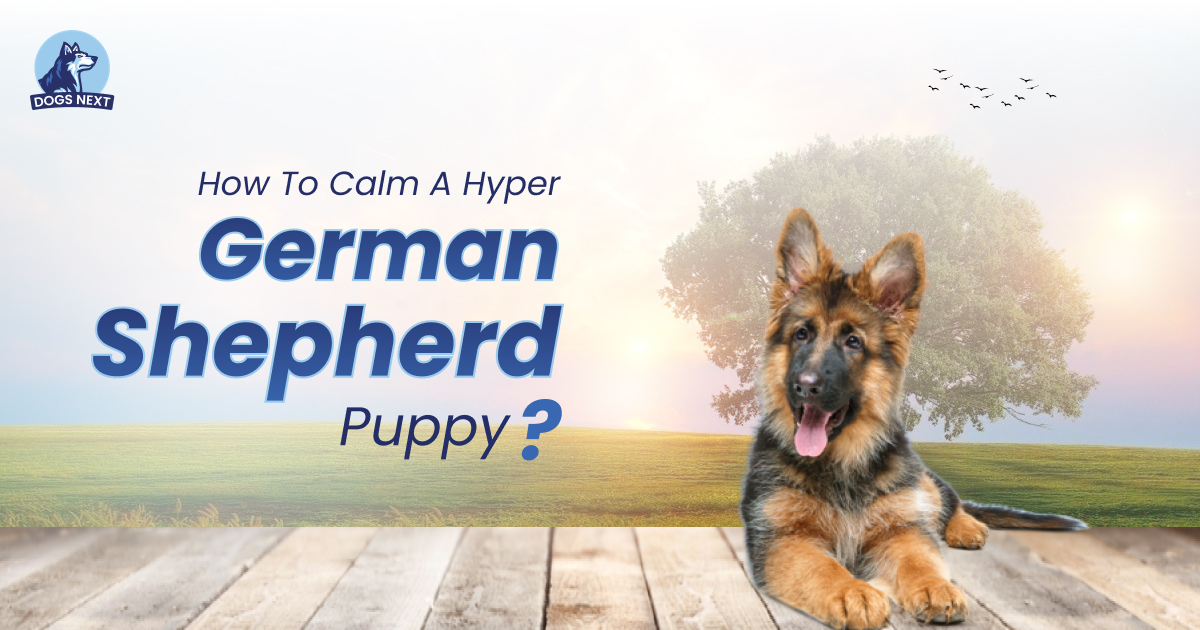German Shepherd puppies are known for their high energy levels and playful personalities, but sometimes that energy can turn into hyperactivity. Hyperactivity in puppies can lead to destructive behavior, disobedience, and anxiety.
As a German Shepherd puppy owner, it is essential to understand how to calm your furry friend to ensure they remain happy and healthy. In this article, we will provide you with some effective tips and techniques to calm a hyper German Shepherd puppy. By implementing these tips and techniques, you can help your puppy stay calm and become a well-behaved companion.
Reasons Why Your German Shepherd Puppy Is Hyper
Before you can calm a hyper German Shepherd puppy, it is essential to understand why your german shepherd puppy is hyper. If your German Shepherd puppy is constantly getting hyper and energetic, there may be underlying reasons causing this behavior.
- Insufficient Exercise: A lack of exercise can be a primary reason for your German Shepherd puppy’s hyper behavior. As mentioned earlier, German Shepherds are an active breed that requires regular physical activity to stay healthy and calm. Aim to take your puppy for walks and provide them with enough playtime to burn off excess energy.
- Reinforcing Negative Behavior: Another reason why your German Shepherd puppy may be hyper is that you may have inadvertently rewarded bad behavior. For example, if your puppy jumps on you or barks excessively for attention, and you respond by petting or playing with them, you are reinforcing the behavior. Instead, ignore bad behavior and reward good behavior.
- Boredom: German Shepherd puppies are intelligent and need mental stimulation to stay calm and happy. If they do not have enough toys or interactive games, they may become bored and hyper. Provide your puppy with toys, puzzles, and training exercises to keep them mentally stimulated.
- Inadequate Training: Proper training is crucial for your German Shepherd puppy’s overall behavior and well-being. If your puppy lacks training, they may become hyper and exhibit undesirable behaviors. Consider enrolling them in puppy classes or working with a professional dog trainer to teach them appropriate behavior.
- Improper Diet: The food you feed your puppy can also affect their behavior. If you feed your puppy a diet high in sugar, grains, or preservatives, they may become hyper and restless. Make sure to provide your puppy with a well-balanced diet that meets their nutritional needs.
- Separation Anxiety: German Shepherds are known to bond closely with their owners and may become anxious when left alone. Separation anxiety can manifest as hyper behavior, such as excessive barking or destructive chewing. Teach your puppy to be comfortable when left alone gradually and provide them with toys and treats to keep them occupied.
- Environmental Factors: Lastly, some German Shepherd puppies may become hyper after getting wet, such as after a bath or swimming. This behavior is entirely normal and may stem from a natural instinct to dry themselves off by shaking their fur. To prevent excessive hyperactivity, provide them with a towel to dry themselves off.
How to Calm Your German Shepherd Puppy
Calmness is an important trait to instill in your German Shepherd puppy, as it can help to prevent destructive behavior and create a harmonious relationship between you and your pet. Here are some ways to calm your German Shepherd puppy:
- Create a Calm Environment: Creating a calm environment is an important step in helping to calm a hyper German Shepherd puppy. A calm environment provides a peaceful space for your puppy to rest and relax, reducing stress and anxiety. This can be achieved by minimizing noise and distractions in your home, providing a comfortable and cozy space for your puppy to rest, and creating a routine that your puppy can rely on. Additionally, using calming scents, such as lavender or chamomile, and ensuring that your puppy has access to fresh water and plenty of natural light can also help to create a calm and serene environment.
- Positive Reinforcement Training: Use rewards and positive reinforcement to encourage good behavior and obedience.
- Practice Relaxation Techniques: Teach your puppy to relax on command, using techniques such as deep breathing and gentle massages.
- Engage in Daily Exercise: German Shepherds are high-energy dogs that require daily exercise to stay healthy and calm. Take your puppy for walks, runs, or playtime to burn off excess energy.
- Provide Mental Stimulation: Mental stimulation can help to calm your puppy by keeping them occupied and engaged. Use puzzle toys, chew toys, or treat-dispensing toys to keep them entertained.
- Playing Frisbee With Your German Shepherd?: Playing Frisbee can provide exercise and mental stimulation for your puppy, but be cautious of over-excitement or potential injuries.
- Socialize Your Puppy: Socialization is crucial for German Shepherd puppies to learn how to interact with people and other dogs. Expose them to different environments and situations, and reward calm behavior.
- Reward Calmness: Praise and reward your puppy when they exhibit calm behavior, to reinforce good habits.
- Aromatherapy: Some scents, such as lavender or chamomile, can have a calming effect on dogs. Use a diffuser or spritz a calming scent in the air to create a peaceful environment.
- Establish a Routine: German Shepherds thrive on routine, so establish a consistent schedule for your puppy, including feeding times, exercise, and sleep.
- Give Your Puppy Treat Dispensing Puzzle Toys: Treat-dispensing toys can provide mental stimulation and reward your puppy for good behavior.
- Stay Calm and Patient: Avoid scolding or yelling at your puppy, as this can create anxiety and fear. Remain calm and patient when interacting with them, and seek professional help if needed.
Techniques for Calming a Hyper German Shepherd Puppy
| Technique | Description |
| Exercise | German Shepherds are high-energy dogs that need plenty of exercise to burn off excess energy. Take your puppy for daily walks or play sessions to help them release energy and reduce hyperactivity. |
| Mental stimulation | Mental stimulation can help tire out your puppy and reduce hyperactivity. Try playing interactive games, such as hide and seek, or provide puzzle toys filled with treats. |
| Crate training | A crate can be a safe, comfortable place for your puppy to rest and calm down. Use positive reinforcement to train your puppy to associate their crate with positive rewards, such as treats or toys. |
| Time-outs | If your puppy is displaying hyperactive behavior, such as jumping or biting, use a time-out to remove them from the situation. Place them in a calm, quiet space for a few minutes to allow them to calm down. |
| Obedience training | Teaching your puppy basic obedience commands, such as “sit” and “stay,” can help redirect their energy and focus their attention. Use positive reinforcement to reward good behavior. |
| Calming signals | Dogs use calming signals, such as yawning or licking their lips, to signal relaxation and calmness. Use these signals yourself to help calm your puppy down. |
| Massage and touch | Physical touch, such as gentle massage or petting, can help calm your puppy and reduce stress. Spend a few minutes each day massaging your puppy’s ears, back, and paws. |
Positive Reinforcement Training For Calm A German Shepherd Puppy
Positive reinforcement training is a method of rewarding desired behavior while ignoring or redirecting undesired behavior. Rewards such as treats, praise, and toys are used to reinforce calm behavior. Consistency, patience, and timing are important aspects of this training.
Here are some positive reinforcement training techniques that can help calm your German Shepherd puppy:
- Relaxation training: Teach your puppy to relax on cue by rewarding them for calm behavior. Start by finding a quiet, calm environment and ask your puppy to lie down. When they do so, reward them with a treat and praise. Gradually increase the amount of time your puppy is lying down before giving them the reward.
- Settle training: Settle training involves teaching your puppy to settle down in a designated spot, such as a bed or crate. Begin by teaching your puppy to associate the spot with positive rewards, such as treats or a favorite toy. Then, ask your puppy to go to their spot and reward them for settling down calmly. Gradually increase the amount of time your puppy stays in their spot before giving them the reward.
- Desensitization training: German Shepherds can be sensitive to loud noises, such as thunder or fireworks. Desensitization training involves gradually exposing your puppy to these noises in a controlled environment and rewarding them for staying calm. Start by playing a recording of the noise at a low volume and reward your puppy for calm behavior. Gradually increase the volume over time, always rewarding your puppy for calm behavior.
- Exercise: German Shepherds are high-energy dogs that require plenty of exercise to stay healthy and calm. Regular exercise, such as daily walks or playtime, can help burn off excess energy and reduce anxiety in your puppy
- Massage and touch: German Shepherds love physical touch and affection from their owners. Massage and touch can be a powerful way to help your puppy relax and reduce anxiety. Spend a few minutes each day gently massaging your puppy’s ears, back, and paws, rewarding them with praise and treats for calm behavior.
- Treat puzzles: Treat puzzles, such as Kongs or puzzle toys, can be a great way to distract your puppy and keep them calm. Fill a puzzle toy with your puppy’s favorite treats and encourage them to work on solving the puzzle. This will help keep their mind focused and reduce anxiety and stress.
Remember, positive reinforcement training is all about rewarding good behavior and redirecting or ignoring unwanted behavior. By rewarding your German Shepherd puppy for calm behavior, you can help them develop good habits and reduce anxiety and stress. With consistency and patience, your puppy will quickly learn to associate calm behavior with positive rewards.
Some key points to keep in mind
- Understand your puppy’s needs for exercise, playtime, and mental stimulation to help them burn off excess energy and stay calm.
- Provide your puppy with plenty of love, affection, and positive reinforcement to reinforce good behavior.
- Avoid punishing or scolding your puppy for bad behavior, as this can cause anxiety and worsen the hyperactivity.
- Use calming techniques like massages, aromatherapy, and calming music to help your puppy relax.
- Consider crate training as a safe and comfortable space for your puppy to relax when they feel overwhelmed or anxious.
- Consistency is key when training a hyper German Shepherd puppy. Stick to a routine and use the same commands and rewards to help your puppy learn.
- Make training a fun and rewarding experience for your puppy. Use treats, praise, and toys to reward good behavior and make training a positive experience for your puppy.
Frequently Asked Questions
Q: How much exercise does a hyper German Shepherd puppy need?
Ans: German Shepherd puppies require a lot of exercise to burn off their excess energy and stay calm. Aim to take your puppy for a walk at least twice a day, and make sure the walks are long enough to provide them with enough exercise. Playing interactive games and enrolling them in dog sports can also help provide physical exercise.
Q: Can toys and puzzles help calm a hyper German Shepherd puppy?
Ans: Yes, providing your German Shepherd puppy with toys and puzzles that challenge their minds and require problem-solving skills can help stimulate their brain and keep them calm. Interactive toys like Kongs and puzzle feeders can keep them mentally stimulated and focused.
Q: How can I prevent my German Shepherd puppy from getting bored?
Ans: Boredom can lead to hyperactivity in German Shepherd puppies. To prevent this, make sure to provide plenty of playtime, both with you and with other dogs if possible. Engage them in training exercises, play interactive games, and provide them with mental stimulation through toys and puzzles. Additionally, make sure they have access to a variety of environments and experiences, such as walks in new places and meeting new people.
Conclusion:
If you want to calm a hyper German Shepherd puppy, it is essential to identify the root cause of their hyperactivity and take steps to address it. By providing your puppy with enough exercise, mental stimulation, and training, you can help them become well-behaved and happy companions. Additionally, creating a calm environment and rewarding calm behavior can also help to reduce hyperactivity. Remember to be patient and consistent in your efforts and seek professional help if necessary. With the right approach, you can help your hyper German Shepherd puppy become a calm and contented pet

I’m David, an expert contributor and writer, with two furry friends of my own, I know the challenges of raising and caring for dogs. From training to nutrition and health, my goal is to provide valuable insights and advice to help create strong bonds and happy, healthy lives. Find me in Twitter.




